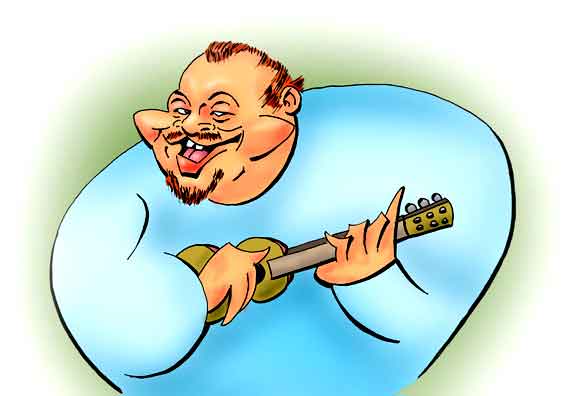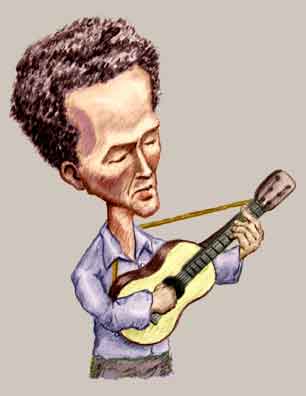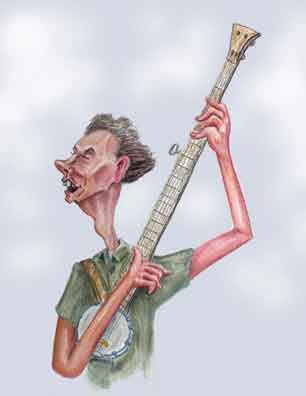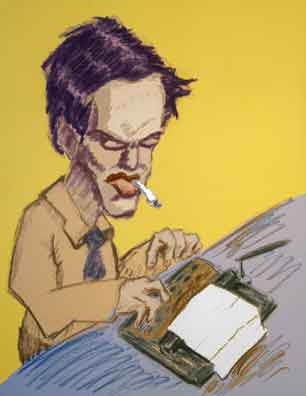Burl Ives

Burl Ives
He once was young.
Burl sings like he was born in lace drawers.
- Woody Guthrie
Well, perhaps Woody's characterization of Burl's smooth high tenor is a bit harsh. But it's also true that Burl was not always the grandfatherly white-haired and goateed folk singer. And when he was the young tawny-haired and goateed folk singer, his voice was even smoother and gentler than when he did become the grandfatherly white-haired and goateed folk singer.
Probably the best way to compare Burl and Woody's singing at their prime is to listen to both men on Back Where I Come From, a radio program broadcast on CBS in 1940. Woody was 28 and Burl was 31. Woody sings "So Long It's Been Good to Know You" (put on as a musical skit with other singers and a full studio orchestra) and Burl sings "The Foggy Dew".
On the way to becoming one of America's most popular (and mainstream) folk singers, Burl did quite a bit more. In the late 1930's he had begun acting in amateur theaters - then as now a place where many famous actors got their start. The experience and his singing landed him a small part in the Broadway production of The Boys from Syracuse. He then went to Los Angeles where he and Eddie Albert (who had starred in the Boys) shared a house in Beachwood Canyon. It was one night there during a jam session that Burl met Woody.
Burl, like only a few other singers who could also act, often separated the two talents. When he picked up an Academy Award it was for a straightforward drama.
Despite what some people think, Burl's Oscar was not for playing Big Daddy Pollitt in Cat on a Hot Tin Roof. Instead his award was for best supporting actor for the role of Rufus Hannassey in The Big Country. But Burl certainly deserved an award for playing Big Daddy.
A word of warning for those who saw the film and decide to go see the play. There are major differences. Not so much in basic plot. Instead it is the tone of the play and the relationship between the characters. For instance, in the scene ...
Well, maybe we better relegate this discussion to a section of
for the Politically Incorrect |

Woody Guthrie
A Bouquet for Burl.
Burl Icle Ivanhoe Ives was born on July 14, 1909 in Hunt, Illinois. It was Burl, not Woody, who had been born into a farming family. Burl's dad was an Illinois farmer, but because in those days college costs were not equivalent to the entire family income for a wealthy family of four where both parents work, Burl was able to attend college. He hoped to become a teacher.
Woody, though, had been born into a comfortably middle class family in the town of Okemah, Oklahoma. But after his mom's symptoms of Huntington's Disease got progressively worse and his dad's businesses began to fail - not to mention their house burning down, the death of his sister in a separate fire, and the near fatal injury of Woody's dad in yet another fire - the Guthrie family fell apart.
Woody is famous for hitchhiking around the country and being an itinerant balladeer. He did ride the rails at times, but preferred hitchhiking which tended to be far less hazardous to one's health.
Burl - who dropped out of college - had become enamored of American folk music and also spent his early adult years hitching around the country learning the songs directly from the people - mostly from the hoboes (as they were then called) he met on the road. Burl performed when he could and worked at odd jobs in between. Like many folks singers of the day, he gravitated toward New York City.
It was in New York that Burl bumped once more into Woody. Woody often stayed with friends until they couldn't stand it any longer (Woody's rather fractious personality was a factor as was his belief that baths were an unnecessary luxury). In 1940 Woody found himself in New York and after wearing out his welcome with Herta and Will Geer (yes, the same Will Geer who played the Grandfather in The Waltons) he stayed with Burl. Woody slept on the couch and didn't bother taking off his heavy (and muddy) boots. The next morning Burl had found the sheets irreparably soiled and shredded. Soon Woody moved out to a cheap hotel where (among other things) he composed a song called "God Blessed America for Me" which he later retitled "This Land is Your Land".
The idyllic life for the urban folk singers came to an end when Japan attacked Pearl Harbor on December 7, 1941. Then when Germany declared war on the United States four days later, America was really in the Second World War.
Burl went into the Army (some stories say the Air Force) where he continued singing on the Armed Forces radio. While serving as Private Ives, Burl was featured in a Broadway musical, Irving Berlin's This is the Army which was later made into a film with some guy whose initials are RR. Burl also was featured in some films which he said was the easiest work he had done. He'd snooze on the set, then get up and say a few lines or sing a song. It was also in 1944 that Burl released his first album The Wayfaring Stranger By the end of the war, he was America's most famous folk singer.
Woody, on the other hand, went into the Merchant Marines - actually quite a hazardous service with the U-Boats proliferating around the Atlantic. Once during a particularly tense time, Woody went below - the worst place to be in case of an attack - and sang songs to calm down the jittery troops.
At this point we must take a pause that if not refreshes, then is one that educates. In the era following World War I, mainstream political parties did not push civil rights as a major issue. Instead, the parties that made a big deal about prejudice and inequality were what are now called the radical left, the Socialists and the Communists. Compared to today, the parties had a respectable following. Starting up with vigor in the 1920's, membership in the American Communist jumped, eventually hitting (supposedly) near 100,000.
As long as we needed Uncle Joe Stalin to fight Hitler, left-wing politics were fine. Life Magazine even ran off one of its most unintentionally humorous issues when it devoted the whole magazine to praise of Russia in general and Stalin in particular. As most of the folk singers were sometimes unabashedly socialistic, or what was even more trendy, communistic, they were happy that the most popular magazine in America was lauding the political system they were sure would bring everlasting peace and prosperity to the world.
But then America won the war, and Winston Churchill came to Fulton, Missouri and delivered his famous "Iron Curtain" speech. Suddenly, what was the greatest system in the world became a terroristic society bent on world domination. Then in 1949, a pamphlet, Red Channels, accused over 150 members in the entertainment industry of harboring unabashedly pro-communist sympathies or even being out and out card-carrying members. Soon many on the list found themselves blacklisted from jobs and even arrested and imprisoned for failing to cooperate with the House Un-American Activities Committee, known to history as HUAC.
And Burl? Well, he had been named in the pamphlet, but he agreed to appear before the committee voluntarily. Despite what you read on some places, it doesn't seem he actually named names - as it was called - and instead told the Committee that they knew who his friends were and they would have to ask them if they were Communists.

Pete Seeger
Burl's Friend
Pete Seeger, who by then had also achieved fame as a folk singer - was summoned to testify as well. The trouble was Pete had indeed been a member of the American Communist Party but later dropped his associations once it became clear Stalin was not the benevolent patriarchal leader Life Magazine said he was. Pete could have said, yes, he had once been a member but felt that in forcing Americans to testify, the Committee was trouncing on their Constitutional freedoms.
So Pete invoked - not the Fifth Amendment of the Constitution as did Lee Hayes, Pete's co-author of "If I Had a Hammer" - but the First Amendment, which Pete said gave him the right to keep his personal views to himself. Just as freedom of religion means you can not practice any religion if you wish, freedom of speech means you can keep your mouth shut. Pete was convicted of contempt of Congress but later had the conviction overturned.
But for a decade, Pete was on the blacklist and the only work he could find was giving concerts to college kids. In 1965 he produced and hosted the television show Rainbow Quest which appeared on a small number of television stations. Rainbow Quest is arguably the best folk music program ever aired, but the distribution was minuscule and only a few stations on frequencies most television sets couldn't receive scheduled the program. It was only toward the end of the tumultuous 60's that Pete began to reappear on mainstream television.
In an interview in his later years, Pete once said he thought times had been harder for those who had cooperated with the Committee rather than those who had not. In the end the House Un-American Activities Committee - like so many Congressional investigations - accomplished nothing of substance.
For people who were supposed to be enemies of America, those on the Red Channels list or who were later blacklisted as commies or commie sympathizers sure seem to have been patriotic and did a lot to make America better. These include Harry Belafonte (popular singer and civil rights activists), Howard K. Smith (ABC broadcaster who gave thoughtful and yet fairly conservative editorials), Orson Bean (comedian and panelist on celebrity quiz programs), Lena Horne (great singer and all around lady), Alan Lomax (famous folklorist and son of his famous folklorist father, John), Yip Harburg (writer of the lyrics of many songs including Somewhere Over the Rainbow), Arthur Miller (playwright and author of The Crucible and once the husband of Marylin Monroe), Charles Chaplin (master comic of the silent era and later), Orson Wells (who directed and starred in Citizen Kane and as an actor had a guest appearance in the Muppet Movie), Robert Shayne (who played Inspector Henderson on the TV series, the Adventures of Superman), Howard Fast (author of the novel Spartacus which was later made into the movie starring Kirk Douglas and who penned The Crossing about George Washington), Gypsy Rose Lee (among other things the most famous ecdysiast in history), Oscar Brand (friend of Pete Seeger and whose album Presidential Campaign Songs is a classic), Peter Viertel (screenwriter who wrote The African Queen), José Ferrer (movie actor whose most famous roles were Iago and Toulouse-Lautrec), Aaron Copland (American composer of "Fanfare for the Common Man", "Appalachian Spring", "Rodeo", and "Billy the Kid"), Richard Attenborough (British actor who starred in The Great Escape), Professor Irwin Corey (yes, even he was blacklisted), Eddie Albert (Burl's old friend and who later starred with Eva Gabor on Green Acres), Ossie Davis (famous actor who appeared in many movies including Bubba-Ho-Tep and Nat Turner: A Troublesome Property), Martin Gabel (Tony Award winning stage actor and husband of Arlene Francis), Zero Mostel (creator of the role of Tevye in Fiddler on the Roof and who played Max Bialystock in The Producers with Gene Wilder), Josh White (master bluesman whose "The House I Live In" sounds amazingly patriotic), Will Geer (who, as we said, played the grandfather on The Waltons), Leonard Bernstein (yes, we mean Lenny), Langston Hughes (famous black author who wrote poetry that actually rhymes and has meter), Ruby Dee (star with Sidney Poitier in Raisin in the Sun), Artie Shaw (often married Big Band leader), and Jeff Corey (highly prolific actor with more roles than we can list as well as an acting teacher who coached Leonard Nimoy).

Alan Lomax
He gave Burl a plug.
You'd think Congressmen would have something better to do. Oh, well, we supposed they have to do something to justify their government supplied no-deductible full-coverage health care and inflation-adjusted pensions.
Burl, though, did not suffer hard times. Over the years many people have trashed Burl for his "cooperation" with HUAC (Irwin Silber, publisher of the folk music publications Sing Out! was particularly discourteous). But we need to remember that Burl simply agreed to appear before the Committee voluntarily knowing that he could have been compelled to testify. Neither Pete Seeger nor Alan Lomax - Alan had been forced to relocate to England after his mention in Red Channels - seem to have held particularly harsh feelings. Pete mentioned Burl on a Rainbow Quest episode when he told about Woody tearing up Burl's sheets, and Alan in his now classic Folk Songs of North America put in a nice plug for Wayfaring Stranger. In later years, Burl mentioned how he and Will Geer had always been friends.
Burl went on to increasing fame and wealth, collecting not only his Oscar, but Emmy and Grammy awards as well. Burl even moved into the late 20th century Star Wars culture when in 1984 he provided the narration for Caravan of Courage: An Ewok Adventure.
Sadly, like many of his generation Burl was a smoker. In 1993 he developed cancer of the throat and died the following year. He was 85.
References and Reading
The Wayfaring Stranger, Burl Ives, Whitttlesey House, 1948.
"Back Where I Come From", Host: Clifton Fadiman, CBS Radio. Broadcast Date: August 19, 1940.
Folk Songs of North America, Alan Lomax, Doubleday, 1950.
Woody Guthrie: A Life, Joe Klein, Knopf, 1980.
"Hoboes Expel 'Tramp' Singer Burl Ieves: He's 'Guilty of Crime of Work'", Pittsburgh Press, December 2, 1945.
Woody Guthrie: America's Folksinger, Karen Coombs, Carolrhoda Books, 2002.
"Woody Guthrie", Rainbow Quest, Pete Seeger (host), Toshi Seeger (producer), 1965.
The Lost One: A Life of Peter Lorre, Stephen Youngkin, University Press of Kentucky, 2005. Here we get a quote from Burl who said his hair was "tawny". Burl and Peter, by the way, were pretty good friends.
Historical Dictionary of the Broadway Musical, William Everett and Paul Laird, Rowman and Littlefield, 2016.
The Curious Survival of the US Communist Party, Aidan Lewis,BBC News, March 1, 2014.
Special Russia Issue, Life Magazine, March 29, 1943. Today this unintentionally hilarious issue is from what was for decades America's top magazine. Written during world War II when we needed Russia to help us defeat Hitler, this issue was devoted entirely to the Soviet Union. It sported a cover portrait of a noble-looking, fatherly Joseph Stalin, an article that stated the country was run by "loyal, capable administrators", peppered with many photographs of happy, well-fed, smiling diverse Russian citizens, and had a passage that mentioned that Lenin was perhaps the "greatest man of modern times". The issue also addressed concerns regarding the lack of free speech in the Soviet Union, but said the proper attitude was "not to get too excited about it", and given what the USSR had accomplished, we can "make allowances for certain shortcomings". So to show our support of Russia in their fight against Hitler (who killed about 20,000,000 Soviet civilians) we did indeed - as the article makes clear - politely overlook many of Uncle Joe's 'shortcomings' - such as allowing 5,000,000 Ukrainians starve in the 1930's and arresting and killing 20,000,000 innocent citizens during his purges.